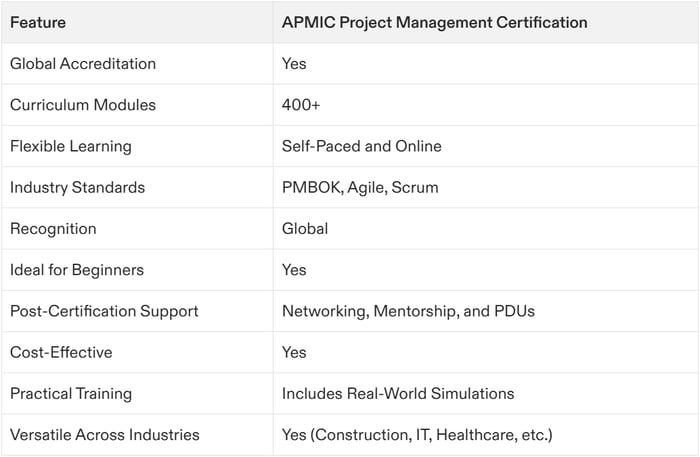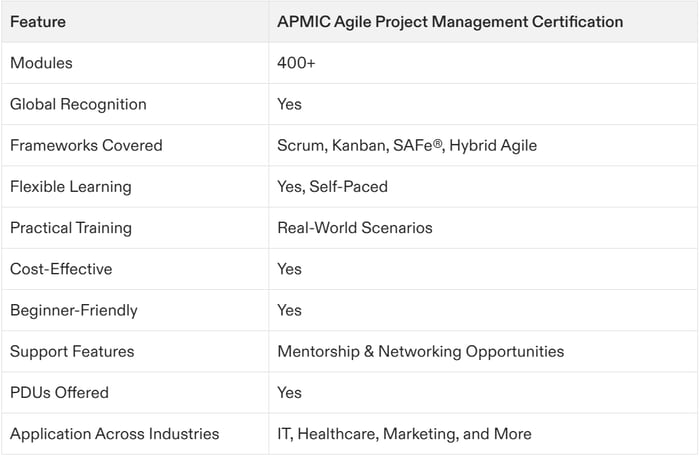Table of Contents
- Why Project Management Certification In Construction Matters?
- What is Localization Project Management, and Why Does it Matter in Construction?
- Must-Have Construction Project Manager Certifications
- How to Become a Localization Project Manager in Construction?
- The Salary and Career Prospects of a Localization Project Manager for 2025
- Final Recommendations: The Reasons to Go for a Certification in 2025
- FAQs on Project Management Certification in Construction
Becoming a project manager in construction by the year 2025 will require more than just hands-on experience. The globalized world, coupled with improving technology and sustainability, means the industry has to be approached with specialized training. Construction professionals can demonstrate their skills by obtaining a project management certification in construction.
But, how do you know what certification will fit your career ambitions the best? Whether you're looking to manage projects within the country, or aiming for an international position, certifications will set you up for success.
This guide assesses the most useful certifications, their advantages, and how they stack against a local project management degree sifted through the global construction management lens.
Why Project Management Certification In Construction Matters?
The rapid evolution of the construction industry brought upon by new technology, sustainable goals, and foreign regulations forces depend on project managers to develop new skills. Obtaining a project management certification in construction provides a professional with the structured knowledge and tools needed to handle such situations.
Certified project managers are better positioned to get senior management jobs because of their knowledge of industry practices, risk management, and resource deployment. Likewise, clients and employers always favor certified personnel because they add value as standard experts to construction work.
Certification creates an advantage, whether supervising local works or international ones because it guarantees compliance with industry standards and regulations.
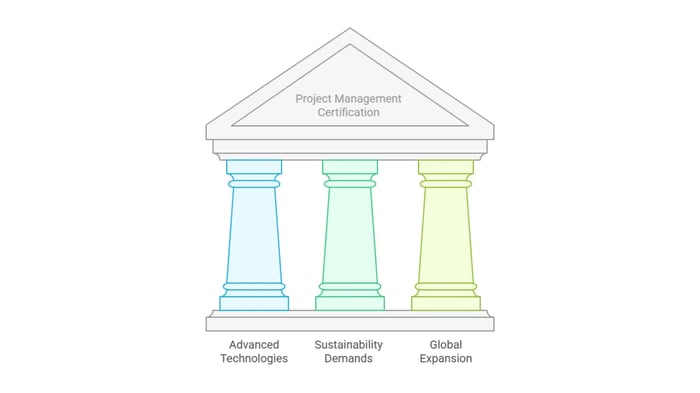
The construction industry is becoming more complex, with:
Advanced Technology – There are new AI technologies for planning, automation, and workflow processes, such as design and construction using digital twins.
Sustainability – Managers must be informed about green building or energy-efficient construction standards.
Globalization – Foreign projects necessitate localization project management degrees for multi-market operations.
With all these changes, a project management certification in construction provides essential training to enable professionals to manage industry shifts constructively. It trains them on essential scheduling, budgeting, and risk management, which is vital for large-scale projects. This working certification, like construction certification online, helps professionals get the required knowledge to undertake sophisticated projects.
What is Localization Project Management, and Why Does it Matter in Construction?
Along with the changing dynamics of globalization, construction is no longer confined to a specific area. Companies have many sites in different countries. This requires knowledge of localization. A localization project management degree specializes in changing construction techniques according to different languages, cultures, and legal contexts in different countries. Considerations for market entry often come with:
- Certifications for Localization Project Management which cover compliance with other countries’ standards and regulations.
- Degrees in Localization Project Management are offered online so students don’t have to miss class for fieldwork.
- Degrees in Localization Project Management are offered in California for those who work on international and domestic projects.
These certificates aid construction managers in attending to multi-regional construction projects by making sure they adhere to local languages, laws, policies, and other compliances.
Must-Have Construction Project Manager Certifications
With your career goals, scope of work, and interests in mind, it’s relatively easy to narrow down the right certification for you from the construction project management certification list. For professionals wishing to master construction project management, the APMIC Project Management Certification in construction is a perfect choice as it has over 400 modules within its curriculum.
Other than the philosophy of construction project management courses, the most popular are the Certified Construction Manager (when taken at Construction Management Association of America (CMAA)) for people dealing with particular CCM, and PMP (Project Management Professional) provided in most industries which focuses deeply on project management. There is also a recognized RICS Project Management Certification in Europe and Commonwealth countries that has an emphasis on strategic planning of projects in construction.
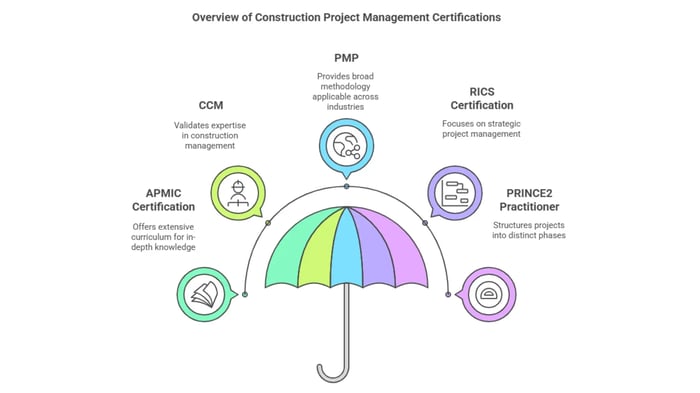
And last, but not least is the PRINCE2 Practitioner in Construction Management who deals with coordinated execution of several projects at different sites, making him/her an asset to multi-site projects.
1. APMIC Project Management Certification (400+ Modules)
A premier certification that meets the needs of new and seasoned professionals. The syllabus includes more than 400 modules and includes:
- Risk management alongside contract management
- Stakeholder’s relationships
- Financial handling in construction
The certification follows international standards on project management, which is perfect for someone who plans to take a localization project manager course.
2. Certified Construction Manager (CCM)
This certification is offered by the Construction Management Association of America (CMAA). It is mainly for those wanting to showcase their skills in construction management.
3. PMP (Project Management Professional)
PMP is surely one of the most celebrated certifications offered by the Project Management Institute (PMI). It offers:
- Comprehensive coverage across sectors and industries.
- Custom training using PMBOK (Project Management Body of Knowledge).
- Added value for those in international project management.
The excellent options provided by PMP are best suited for those in specialized fields like localization construction project management.
4. RICS Project Management Certification
This credential is recognized in Europe and Commonwealth countries as an award for strategic project management within the context of the built environment.
5. PRINCE2 Practitioner in Construction Management
Practitioner in Construction Management PRINCE2 is a result-oriented methodology that divides projects into logical functional phases. This approach is helpful for those managing large international multi-sited projects needing localization.
Pro Tip: It is always best to investigate project management certification prior to choosing any one credential in order to grasp the advantages, implications, and scope attached to each certification.
How to Become a Localization Project Manager in Construction?
Localization project managers help ensure international construction efforts align with local regulations, cultural expectations, and language comprehension; thus, international construction projects run smoothly. The first step toward this career path is obtaining a degree or certification in localization project management, which focuses on the mobility of projects across different markets.
Hands-on experience with cross-border projects involving foreign contractors or suppliers enables practitioners to understand global compliance issues more accurately. A project manager’s effectiveness in multi-regional projects increases with the mastery of technical tools, such as project scheduling software, risk assessment applications, and AI-based translation software.
Keeping abreast with the latest developments in construction localization, including emerging trends such as sustainability policies, digital twin modeling, and international employment legislation, will ensure professionals remain competitive in the global marketplace.
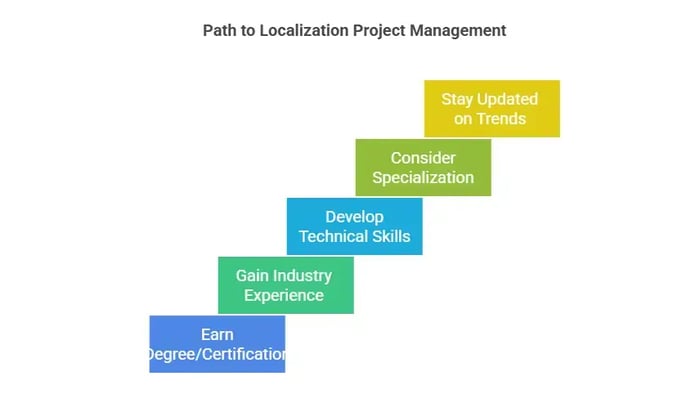
With the expansion of businesses internationally, localization project management certification has become a high-demand credential. Below are the steps that can be taken to venture into this area:
Earn a Relevant Degree or Certification – A localization project management degree or a construction-specific certificate will provide basic insight into the field.
Gain Industry Experience – Work on projects involving cross-border compliance and multilingual documentation.
Develop Technical Skills – Familiarize yourself with project scheduling software, risk assessment tools, and international building regulations.
Think About Specialization – Take a course in the coordination of localization projects to improve cross-cultural communication and legal management skills.
Keep Track of Changes in Industry – AI-based interpretation applications and multi-region digital twin modeling are progressive shifts that require watching.
An efficiently designed online program in the management of localization projects will assist in career progression without sacrificing flexibility for working professionals.
The Salary and Career Prospects of a Localization Project Manager for 2025
There is a pronounced need for localization project managers in specific fields like construction, IT, and engineering. The salary range is determined by years of experience, geographical location, and the specific field they work in.
Entry-Level: $60,000 – $80,000 per year
Mid-Level: $85,000 – $110,000 per year
Senior-Level: $120,000+ per year
Those holding a certification in localization project management are well compensated, especially if undertaken in multi-national marketing projects.
Final Recommendations: The Reasons to Go for a Certification in 2025
With increased digitization and globalization of construction, there has to be a shift in the approach taken by project managers. A project management plan in construction supporting localization strategies will retain value in the market. For those wanting to obtain an internationally recognized diploma, the PMI certifications give users a good base for understanding the principles of project management accompanied by construction techniques.
Obtaining a degree in localization project management or certification such as APMIC will enhance your career prospects and allow you to take advantage of great international job opportunities.
Start today, and let’s build a stronger tomorrow in construction project management.
FAQs on Project Management Certification in Construction
1. What is the best project management certification for construction?
Understanding your career goals is important in determining the best certification for you. APMIC offers a project management certification with one of the most complete curricula for construction and localization specialists.
2. Is a certification necessary for construction project managers?
Not always, but it does increase credibility as well as job opportunities. Certifications also equip a manager to handle multi-country and multi-market projects.
3. How much does a construction project management certification cost?
Prices differ. APMIC and other programs are priced in a way that is appealing to the market, while some PMP certifications can cost well over $500.
4. What skills will I gain from a construction-focused certification?
You will learn about schedules, budgets, risk management, legal compliance, and localization, among other things. APMIC and other programs also include Agile modules.
5. Can I study for a localization project management degree online?
Absolutely – a number of colleges provide a recognized credential in localization project management online. This is ideal for industry professionals who work full-time.
6. What is the estimated time to obtain a certification?
The answer relies on the programs offered. Programs with flexible timelines such as APMIC offer self-paced coursework, while more traditional certifications may require several months of focused effort.
7. Does a localization project management certificate have value for professionals in the construction industry?
Definitely. The spread of international construction projects means that understanding localization, strategies for compliance, and multi-language project management distinguishes the professional.



